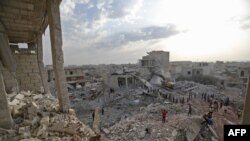U.N. human rights experts warn that all-out war in the northern Syrian enclave of Idlib would result in the massacre of civilians worse than any other seen throughout more than seven years of war.
Since Syria's civil war broke out in 2011, more than 6.5 million people have become internally displaced. The three-member Independent Commission of Inquiry finds fighting has forced more than 1 million people to flee their homes in less than the first six months of this year. It says this unparalleled number of displacements is due to escalating battles by pro-government forces to recapture territory from armed groups and terrorist organizations.
The U.N. investigators say they fear what might happen if Syria and its allies mount a full-scale war to retake Idlib, the last rebel-held enclave in the country.
"The civilian population ... should not be held hostage to a war on terror," said inquiry commissioner Hanny Megally. "We have no problem with states going after terrorists, armed groups, et cetera, if they have committed crimes or are about to commit crimes. But not at the cost of innocent civilians."
Commission chair Paulo Pinheiro says all parties involved in the conflict and those states who support them must do everything in their power to prevent a massacre in Idlib, which would make all previous massacres pale by comparison. He says a political solution must be found.
"Conflicting parties must cease and refrain from the future of indiscriminate weapons or tactics to target the estimated 10,000 fighters interspersed among 2.9 million civilians, including 1 million children," Pinheiro said.
The commission report highlights six key battles fought between January and June, which led to mass displacements. It says intense fighting in Aleppo, northern Homs, Damascus, Rif Damascus, Daraa and Idlib governorates were marked by war crimes.
The commission notes a large proportion of the 1.5 million people currently displaced in Idlib fled there from those previous battles. It warns that another offensive launched with little regard for civilian life would generate a catastrophic human rights and humanitarian crisis.




